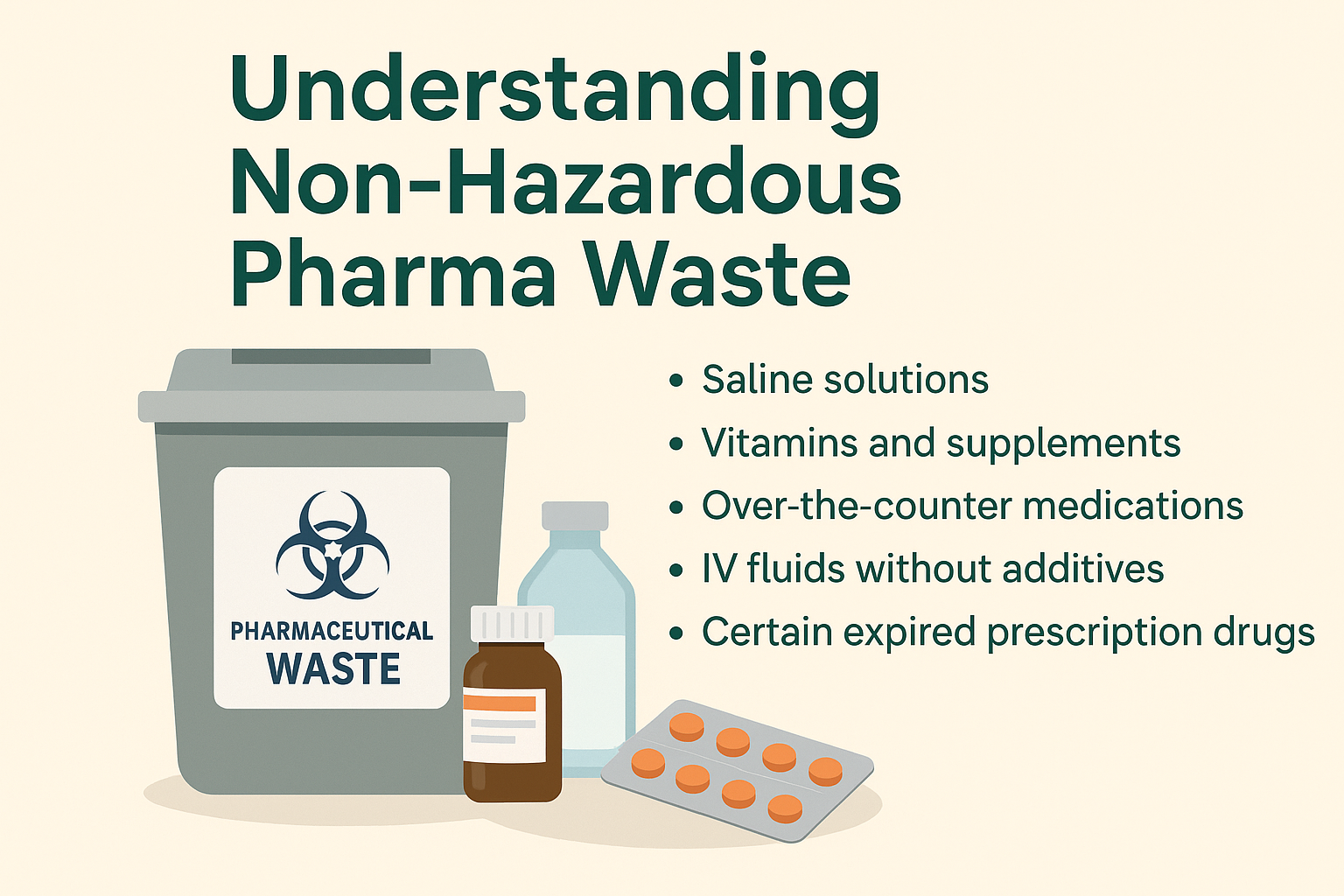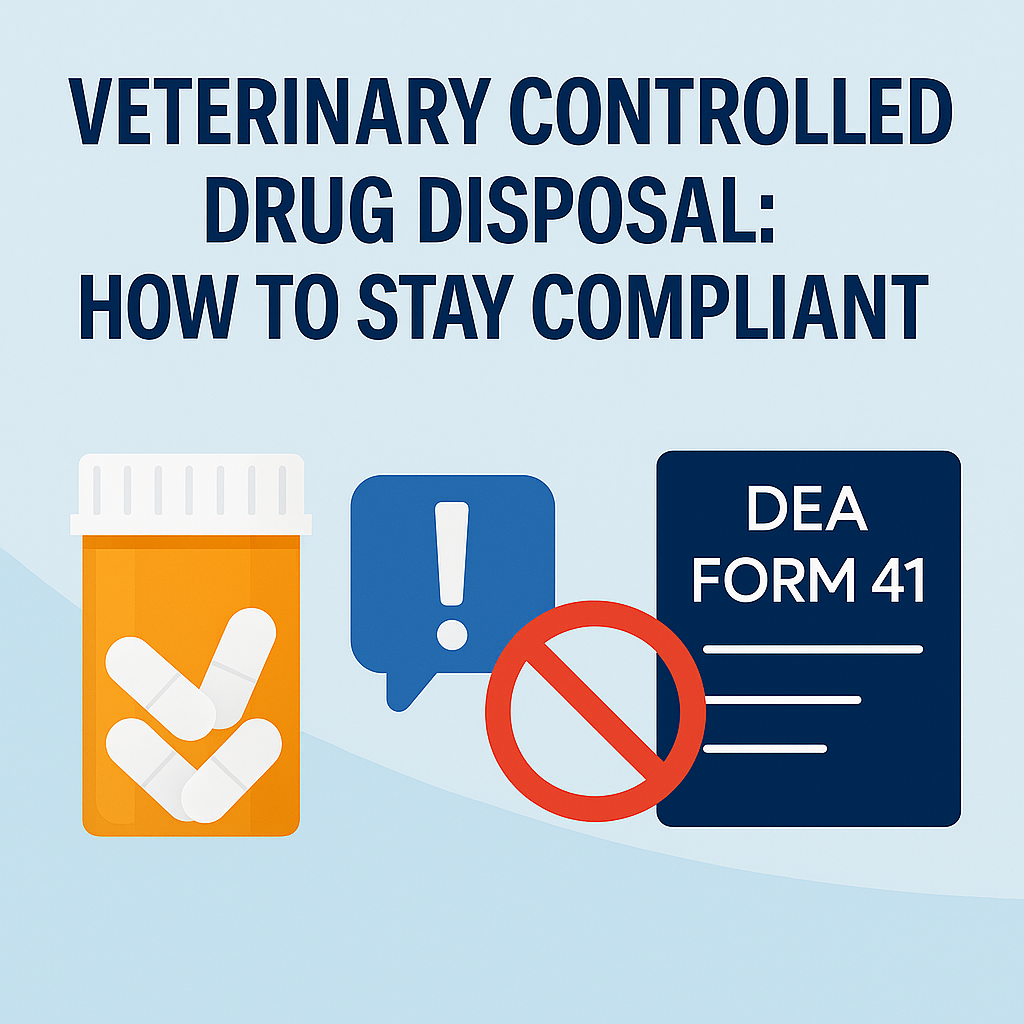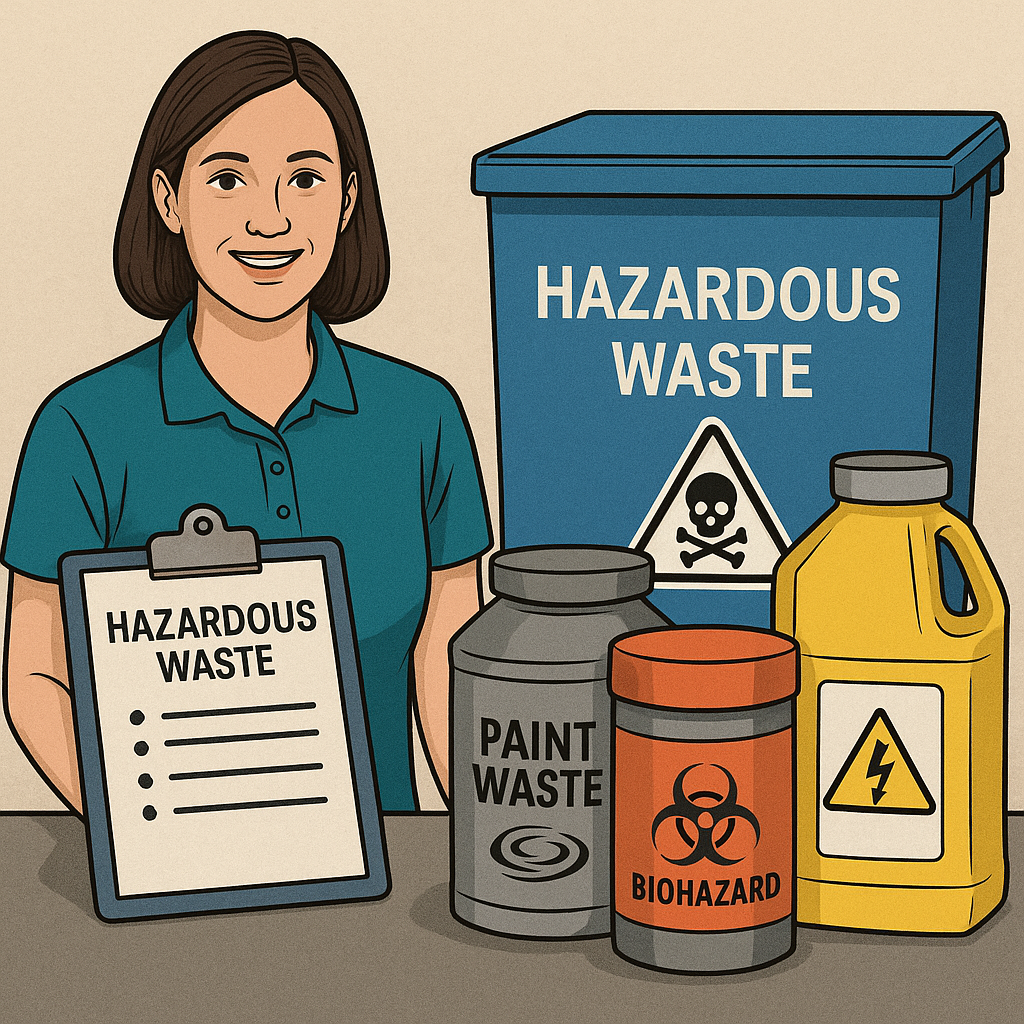How to Dispose of Controlled Drugs for Hospitals
Why Dispose of Controlled Drugs for Hospitals Matters Hospitals manage a wide variety of controlled substances, including opioids, sedatives, and...
3 min read
Chuck Miller : May 25, 2025 10:31:52 AM

Non-hazardous pharmaceutical waste is a type of medical waste that includes expired, leftover, or unused drugs that do not meet the criteria for RCRA hazardous waste. Under the Resource Conservation and Recovery Act (RCRA), the Environmental Protection Agency (EPA) defines certain drugs as hazardous due to their toxicity, reactivity, flammability, or corrosiveness. Non-hazardous pharma waste does not fall into those categories — but it still must be managed correctly.
These substances are still considered solid waste and must be handled in a way that protects human health and the environment.
IV bags without additives
Saline solutions
Over-the-counter (OTC) medications
Nutritional supplements
Certain expired prescription drugs
Even though these aren’t classified as hazardous, pharmaceutical waste management protocols still apply — especially in healthcare facilities that generate large volumes of waste.
Just because something isn’t labeled hazardous doesn’t mean it can go in the trash. Improper disposal of non-hazardous medical waste — including pharmaceutical products — can:
Pollute water systems
Create risks for patients, staff, and the public
Violate EPA waste regulations and Occupational Safety and Health (OSHA) standards
Result in legal and financial penalties
Ensures compliance with state and federal disposal of hazardous waste rules
Reduces risk of exposure in the workplace
Protects the reputation of your facility
Demonstrates environmental responsibility
Check out our Pharmaceutical Waste Management: A Complete Guide!
Understanding the different types of pharmaceutical waste is critical for compliance.
| Category | Non-Hazardous Pharma Waste | RCRA Hazardous Waste |
|---|---|---|
| Risk Level | Low | High (toxic, flammable, reactive) |
| Examples | OTC meds, saline, multivitamins | Nicotine, warfarin, chemotherapy drugs |
| Regulated By | EPA (solid waste standards) | EPA (RCRA Subtitle C) |
| Container Type | White/blue pharma bins | Black hazardous waste containers |
| Requires Special Manifest | No | Yes |
Even non-hazardous waste must be managed as part of your overall pharmaceutical waste management program to prevent it from becoming a compliance risk.
Keep non-hazardous medical waste separate from:
Controlled substances
Sharps
RCRA hazardous waste
Biohazard or infectious waste
Clearly label and color-code your bins to avoid cross-contamination.
Use puncture-proof, leak-resistant white or blue containers labeled for non-hazardous pharmaceutical waste.
Work with a medical waste company that understands waste regulations and handles everything from pickup to final disposal. They’ll help you remain compliant with Environmental Protection Agency and state-specific rules.
Documentation is crucial for audits and inspections. Track what you dispose of, when it’s picked up, and how it’s processed.
Most healthcare facilities produce non-hazardous pharmaceutical waste, including:
Hospitals and outpatient surgery centers
Nursing homes and long-term care centers
Veterinary clinics
Pharmacies (retail, compounding, and mail-order)
Labs and research institutions
Correctional healthcare systems
These organizations handle a variety of controlled substances and pharmaceuticals, and they must comply with both EPA and DEA regulations depending on the waste type.
Non-hazardous waste is typically:
Incinerated in high-temperature facilities
Landfilled in approved, secure disposal sites (when permitted)
While not subject to the same restrictions as RCRA hazardous waste, non-hazardous waste must still be processed by licensed facilities in accordance with federal and state waste regulations.
The Environmental Protection Agency outlines how to handle non-hazardous pharmaceutical waste as part of overall solid waste and medical waste programs. Additionally, the Drug Enforcement Administration (DEA) governs the proper disposal of controlled substances.
Helpful resources include:
DEA: Drug Disposal Guidelines
Your disposal partner should be well-versed in both hazardous and non-hazardous waste regulations to guide your team.
Request a Compliant Audit Today!
At Easy Rx Cycle, we provide comprehensive solutions for pharmaceutical waste management — including non-hazardous and RCRA hazardous waste, controlled substances, sharps, and biohazard materials.
White-labeled containers for non-hazardous waste
Scheduled pickups (weekly, bi-weekly, or monthly)
Compliance documentation and support
Service across Arkansas and the Southeast
Flat-rate pricing with no hidden fees
We help your facility protect human health, maintain regulatory compliance, and simplify waste logistics.
Request a Quote Today!
Need help managing your non-hazardous pharma waste? Easy Rx Cycle is here to assist with safe, legal, and affordable disposal.
Contact us now to request a free quote or schedule your first pickup.
Can I throw non-hazardous pharma waste in the trash?
No. Even though it’s not RCRA hazardous, it must be disposed of properly to comply with solid waste and medical waste regulations.
What’s the difference between hazardous and non-hazardous pharma waste?
Hazardous waste meets strict criteria under the Resource Conservation and Recovery Act (RCRA). Non-hazardous waste does not, but still must be managed responsibly.
Are over-the-counter meds considered non-hazardous?
Yes. Most OTC drugs like ibuprofen or vitamins fall into the non-hazardous category — but they still must be segregated and disposed of correctly.
Does OSHA have a role in pharma waste disposal?
Yes. The Occupational Safety and Health Administration (OSHA) mandates safe handling practices for staff who deal with any form of medical or pharmaceutical waste.

Why Dispose of Controlled Drugs for Hospitals Matters Hospitals manage a wide variety of controlled substances, including opioids, sedatives, and...

How to Dispose of Controlled Drugs for Hospice Care Hospice care providers routinely manage controlled substances to ensure comfort and quality of...

How Healthcare Facilities Should Dispose of Hazardous Waste